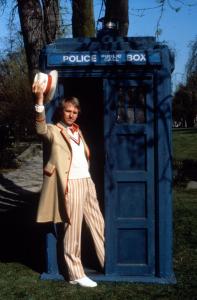He will now get the chance to come face to face with some of the Timelord’s most feared adversaries again when he hosts the Doctor Who Symphonic Spectacular at the SSE Hydro next week.
Davison, who played the fifth incarnation of the Timelord, was asked to host the spectacular, which combines Murray Gold’s music, played by a live orchestra, with some of the show’s favourite monsters, after introducing a segment at the Doctor Who Prom in the Royal Albert Hall. He toured Australia and New Zealand with the production before bringing it to Scotland for the first time.
He said: “The show is a bit of everything really. At its heart it’s a symphonic concert but behind the stage we run various clips and we have Doctor Who aliens and monsters creeping around the auditorium, sneaking up on you and I introduce pieces of music and have a bit of a joke.
“I think hearing a symphony orchestra play live is something really special. I just love the idea of these families coming along who would never go to an orchestral concert and hearing the power of that music being played.”
Davison took over the role of the Doctor from Tom Baker in 1981 and played the part for three years.
However, despite the BBC hit sci-fi show’s cancellation in 1989, he knew it would return.
He said: “I always thought it would come back because it was such a brilliant idea and it had been successful for so long and the fans are so devoted. I didn’t anticipate it would come back in the way that it did as the BBC’s number one prestigious show so that was a surprise but it was very nice because the first producer Russell T Davies was a big fan.”
The show began in 1963 and Davison believes the key to its longevity has been its creativity.
He said: “He’s sort of a British superhero. He doesn’t fit the mould of American superheroes, he doesn’t have special powers but he’s definitely a force for good.
“It’s such a wonderful idea and the scope of the programme is enormous. The genre of science fiction, love it or hate it, means you can tackle virtually any story in virtually any period of time. I think that’s been the secret of its success, it’s inspired creative parts of people’s brains.”
Davison has returned to the role a few times, appearing in the 1993 Children in Need special Dimensions in Time, 2007’s Timecrash with son-in-law David Tennant and the Five(ish) Doctors, which he wrote for the show’s 50th anniversary as well as numerous Big Finish audio adventures.
He has even influenced the new show, which returned to screens in 2005, with many people who work on it, including current showrunner Steven Moffat, saying he was ‘their Doctor’.
He said: “It’s great. I myself was influenced by an earlier Doctor. Patrick Troughton was my Doctor and he had an element of vulnerability which I wanted to bring back into the show and I think that’s something that people identify with.
“A lot of people have come up to me and said Doctor Who helped them through a difficult part in their childhood. I think he’s a great role model.”
Davison’s also a big fan of new Doctor, Peter Capaldi.
He said: “I like his portrayal enormously. I interviewed him for BBC America before it went out and he had some great ideas. He wanted to do a slightly different take and his was that his Doctor wasn’t entirely sure that the human race was worth bothering with. Obviously, in the end, he does but it’s an amusing take.”
However, he does not believe that the show is becoming too scary for children.
He said: “I think adults are the last people who can judge whether Doctor Who is scary, they have no qualifications at all. What we think our children find scary, they find tremendously exciting and invigorating. There are bound to be some people who are a bit scared and they might even have the odd nightmare and of course that’s unfortunate but it comes out of loving the series.
“It’s always had that effect really. In my day there were children who used to spend the entire series watching the programme from behind a sofa.”
The Doctor Who Symphonic Spectacular will visit the SSE Hydro in Glasgow on Friday, May 29.









